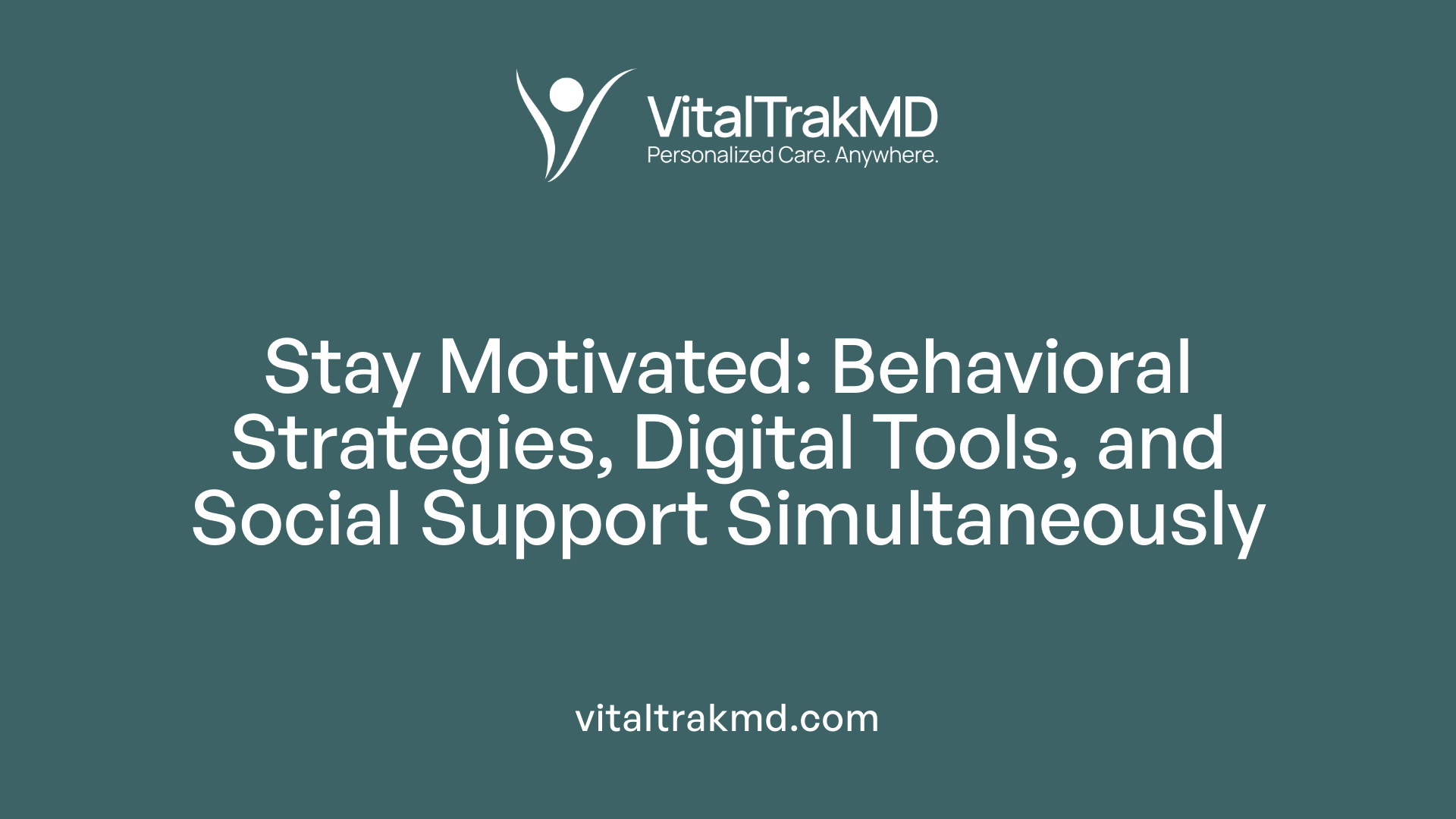The Role of Hybrid Care in Simplifying Multi-Condition Health Management

Bridging Care for Multiple Health Challenges
Managing multiple chronic conditions presents significant challenges for patients and healthcare providers alike, requiring coordinated efforts that span various specialties and care settings. The hybrid care model—integrating in-person and virtual healthcare interactions—has emerged as a promising solution to simplify and enhance multi-condition health management. This narrative explores how hybrid care frameworks optimize wellness and weight loss programs while addressing mental health and personalized care needs, ultimately streamlining complex care delivery and improving patient outcomes.
Core Components of Hybrid Care for Effective Wellness Programs

What are the key components of effective wellness programs?
Effective wellness programs focus on promoting physical activity, providing nutrition guidance, supporting mental health, and offering regular health screenings to prevent chronic diseases. These programs frequently utilize multiple delivery methods, including digital applications, onsite services, and organized health events, to increase participant engagement and reach a broader audience.
How do telehealth and in-person services integrate in hybrid care models?
The hybrid care model blends telehealth consultations and in-person visits to optimize care delivery. Telehealth enables real-time video or phone interactions for follow-ups, examination reviews, and medical advice, using platforms such as WhatsApp®, Google Meet®, Zoom®, and Moodle®. In contrast, in-person consultations are reserved for physical exams, complex diagnostics, and procedures, ensuring comprehensive care when hands-on services are necessary.
What role does health education play in hybrid care?
Health education is a core component of the hybrid model, incorporating multidisciplinary programs that promote chronic disease self-management, nutrition and obesity prevention, and emotional wellbeing. These programs empower patients with knowledge and skills to maintain healthier lifestyles, which directly supports wellness initiatives aimed at weight management and chronic condition control.
What legal and communication considerations are important in wellness programs?
Wellness programs must comply with legal regulations such as the ADA, GINA, HIPAA, and ACA to protect employee health information and prevent discrimination. Clear, consistent communication is vital to maintain trust, ensure voluntariness, and demonstrate program value. Ongoing assessment and reporting of outcomes, including healthcare cost reductions and improved productivity, help refine these programs and sustain engagement.
| Component | Description | Examples/Tools |
|---|---|---|
| Telehealth Consultations | Remote patient follow-ups and health monitoring using various video/phone platforms | WhatsApp®, Zoom®, Google Meet®, Moodle® |
| In-Person Consultations | Physical exams and procedures following quality and safety standards | Clinic visits, diagnostic tests |
| Health Education Programs | Multidisciplinary classes addressing chronic disease, nutrition, and emotional health | Self-management classes, nutrition sessions |
| Legal Compliance & Privacy | Ensuring confidentiality, non-discrimination, and regulatory adherence | ADA, GINA, HIPAA, ACA adherence |
| Communication & Engagement | Clear messaging, reminders, educational content, and ongoing assessments | Digital reminders, surveys, chat features |
Integrating Care for Sustainable Weight Loss Success

How do weight loss programs integrate care to support long-term success?
Weight loss programs increasingly rely on multidisciplinary approaches that combine various aspects of care to ensure sustainable success. These programs often include personalized elements tailored to individual needs, encompassing medical oversight, nutritional guidance, behavioral therapy, and ongoing support. Medical professionals, such as doctors and dietitians, collaborate with psychologists and behavioral therapists to address both the physiological and psychological components of weight management.
In hybrid care models, patients benefit from a blend of in-person visits and virtual consultations, which enhance access and convenience. Regular consultations allow for close monitoring of progress and adjustment of treatment plans. Behavioral therapy helps patients adopt healthier habits and tackle emotional challenges related to weight loss.
Specialized medical options, including meal replacement plans, endoscopic procedures, or bariatric surgery, are incorporated for suitable candidates, with thorough medical evaluation ensuring safety. Moreover, long-term maintenance strategies emphasize continued engagement through follow-up appointments, lifestyle coaching, and peer support groups. These strategies aim to prevent weight regain and promote lasting health improvements.
The integration within hybrid models facilitates coordinated care, combining the advantages of face-to-face interaction with the flexibility and reach of telehealth. This approach not only improves adherence but also reduces barriers such as travel difficulties or scheduling conflicts, ultimately supporting sustained weight loss and wellness.
The Vital Intersection of Mental Health in Wellness and Weight Management

What role does mental health play in wellness and weight loss programs?
Mental health is fundamental to the success of wellness and weight loss programs. Psychological well-being affects motivation levels, eating habits, and emotional regulation — all crucial factors for maintaining healthy behaviors. Stress, anxiety, and depression can trigger emotional eating, hormonal changes, and lapses in adherence to diet and exercise, thus impeding weight management progress.
How do psychological factors affect care adherence?
Individuals facing mental health challenges often struggle with consistency in following program guidelines. Negative emotions can reduce self-discipline and create cycles of unhealthy habits. Addressing these psychological hurdles helps to improve therapeutic adherence, leading to better outcomes.
What strategies effectively integrate mental health support into hybrid care models?
Hybrid care offers an ideal framework to embed mental health support through multidisciplinary education programs and virtual consultations. Techniques such as mindfulness training, self-compassion exercises, therapy sessions, and peer support groups can be delivered via telehealth platforms alongside in-person visits. This integration ensures patients receive continuous emotional support tailored to their needs.
What are the benefits of including mental health care in hybrid models?
Incorporating mental health into hybrid wellness programs enhances motivation, fosters resilience, and improves long-term maintenance of weight loss. It also creates a positive feedback loop, benefiting both emotional stability and physical health. By combining virtual and in-person care, patients gain flexible access to comprehensive support, which improves adherence, reduces healthcare costs, and elevates overall patient experience.
| Aspect | Description | Impact on Wellness Programs |
|---|---|---|
| Motivation & Adherence | Mental health influences willingness to follow through with diet and exercise plans. | Enhances consistency and engagement |
| Emotional Regulation | Managing emotions prevents triggers like stress-eating or binge behaviors. | Supports sustainable lifestyle changes |
| Hybrid Care Integration | Use of telehealth for counseling and education combined with face-to-face support. | Expands access and personalizes care |
| Outcomes | Improved mental well-being contributes to better weight management and overall health. | Promotes long-term success and reduced relapse rates |
Integrating mental health care within hybrid models not only addresses physical health goals but also sustains emotional wellness, making weight loss and wellness efforts more achievable and lasting.
Personalized Hybrid Care: Tailoring Programs for Multi-Condition Patients
How can personalized care programs enhance the effectiveness of wellness and weight loss efforts?
Personalized hybrid care programs significantly improve wellness and weight loss outcomes by customizing interventions to meet each patient's unique health profile, lifestyle, and preferences. Such tailored approaches increase patient engagement and motivation by aligning care with individual goals and medical needs.
These programs integrate various modalities including medical management, nutritional counseling, behavioral therapy, and occasionally minimally invasive or surgical options. By addressing the biological, psychological, and social factors influencing weight and overall health, patients receive comprehensive, evidence-based care customized for their multiple conditions.
Remote monitoring technologies and digital platforms play a crucial role in these hybrid models. They enable continuous tracking of vital signs, physical activity, and treatment adherence, while providing educational resources and timely reminders. Features like telehealth consultations, chat support, and virtual coaching further enable patients to stay connected with their healthcare team beyond traditional appointments.
Multidisciplinary teams—including physicians, dietitians, behavioral therapists, and health educators—offer continuous support that ensures coordination of care. This collaborative approach helps patients navigate treatment adjustments, manage chronic conditions effectively, and maintain lifestyle changes necessary for long-term success.
In summary, personalized hybrid care creates an adaptable framework that fosters improved therapeutic adherence, sustained weight management, and enhanced wellness, particularly for patients managing multiple health conditions.
Sustaining Long-Term Engagement and Outcomes Through Hybrid Care

What strategies do successful wellness and weight loss programs use to maintain participant motivation over time?
Successful wellness and weight loss programs sustain motivation by integrating behavioral strategies focused on goal setting, self-monitoring, and receiving regular feedback. These programs encourage participants to set realistic, process-oriented goals—such as tracking daily behaviors and celebrating small successes—to maintain continuous motivation. Enjoyable physical activities and positive self-talk are vital, as they help individuals stay committed and overcome setbacks.
How do behavioral tools and social support contribute to sustained health improvements?
Behavioral tools enhance self-efficacy, motivation, and body image appreciation, which are key to perseverance in lifestyle changes. Programs often include environment restructuring to foster healthier routines. Social support from healthcare professionals, family members, and community networks provides encouragement and accountability, increasing the likelihood that participants will maintain new habits. This supportive framework helps participants develop ownership of their health journey.
What role do digital engagement features play in hybrid care models?
Digital platforms enhance hybrid care by offering reminders, educational content, chat features, and self-monitoring tools. These features promote consistent engagement by making it easier to track progress and access resources anytime. The combination of virtual and in-person interactions allows flexibility, meeting patients where they are and reinforcing behavioral changes with real-time feedback and support.
What advantages does hybrid care provide in managing chronic diseases over the long term?
Hybrid care models improve chronic disease management by blending remote monitoring with in-person assessments, enabling timely adjustments to care plans. This approach reduces missed appointments and facilitates continuous monitoring of conditions. Moreover, hybrid care supports better therapeutic adherence and reduces overall healthcare costs by minimizing unnecessary emergency visits. Its capability to deliver personalized care strengthens patients’ ability to sustain lifestyle improvements critical in managing chronic illnesses.
| Focus Area | Strategy or Feature | Impact on Engagement and Outcomes |
|---|---|---|
| Behavioral Strategies | Goal setting, self-monitoring, positive reinforcement | Sustains motivation and fosters resilience |
| Social Support | Professional guidance, family/community involvement | Provides accountability and emotional encouragement |
| Digital Tools | Reminders, education, chat and tracking features | Enhances access, convenience, and consistent engagement |
| Hybrid Care Structure | Combines telehealth and in-person visits | Enables personalized, continuous, and flexible care |
This integrated approach facilitates long-term adherence to healthy behaviors, making hybrid care an effective model for managing wellness and chronic conditions alike.
The Future of Multi-Condition Care Lies in Hybrid Models
Hybrid care represents a pivotal advancement in managing the complexities of multi-condition health challenges. By seamlessly integrating in-person and virtual services, it supports comprehensive wellness and weight loss programs that incorporate mental health and personalized interventions. The model enhances patient convenience, optimizes resource utilization, and fosters sustained engagement—all critical factors for improved long-term health outcomes. As technology and healthcare delivery evolve, hybrid care frameworks will likely become foundational in chronic disease management, empowering patients and providers alike to better navigate the intricacies of modern healthcare.
References
- How the Hybrid Care Model is Transforming Patient Access
- Development of an evidence-based hybrid model in the ...
- Healthcare's Future Is a Hybrid Model
- Rapid synthesis: Optimizing the use of hybrid-care models ...
- Designing and Managing Effective Wellness Programs
- Promoting Health and Wellness in the Workplace
- Mental Health's Role in Successful Weight Loss
Recent articles
Want to Feel Better and Live Healthier?
Join hundreds of patients taking control of their health with personalized care that fits their life – not the other way around.
Rated 4.8/5 by 32+ customers







